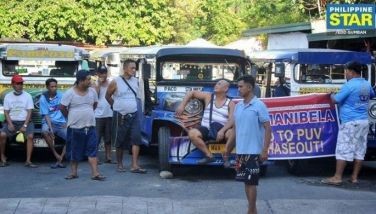Postcript to supertyphoon Yolanda
This is not the proper time for blaming and finger pointing. This is not an opportune time for Filipinos to criticize the government for whatever its failures and deficiencies. After all that have been said and done, and now that we are facing an extensively damaged Tacloban, Ormoc, Guiuan, Eastern Samar, and even our own northern Cebu towns, as well as Panay and Palawan, it is time to reflect deeply on the lessons that we learned from that tragic natural disaster. It is now the opportune time to emerge from such calamity as a better nation and a more responsible citizenry, and also hopefully, a better prepared government. After such a devastating tragedy, the Filipino people should emerge to be a stronger nation. And so, what did we learn from that horrible experience?
Our first realization is that our people have not been adequately informed nor sufficiently educated on the realities of the environment. The Filipinos do not have full knowledge on the vulnerability of our whole country, being in the Ring of Fire and in the Typhoon Belt. We are not even safety-conscious in the way that we build our homes. It would seem that, perhaps due to poverty, many of our people are contented with makeshift huts, and we locate our homes in areas that are extremely vulnerable to natural disasters. Even concrete and semi-concrete homes are not really designed to avoid or withstand the furies of nature. Architects and contractors are not really conscious of the impact of calamities to their construction. The first lesson that we learned is that our country and our citizens are not prepared for disasters.
Our second realization is that our government and private sector responses are not properly planned, organized and managed. There is no clear delineation of responsibilities between the national and local government units. This was illustrated when the President was reported to have walked out from a post-disaster assessment meeting, and was said to have blamed the City Mayor of Tacloban for alleged lack of preparedness. This would not have come about if there is a clear line of responsibility and accountability among different echelons of government. Security, for instance, rescue and relief distribution are bound to be chaotic and in disarray if there is no over-all leader who calls the shots on priorities and volumes of goods for specific locations. Our second lesson is that our government and private sectors are not organized enough to respond to such a magnitude of disaster.
Our third realization is that, even if we do have an adequately prepared people and a well-organized government, there are many factors that are not within the control of man nor of government. For instance, even if we have the resources to bring to the disaster-stricken areas, if the highways and roads are not passable, if the bridges have collapsed, the goods are bound to be delayed. Government can not be blamed for it. If there are 11.5 million people who lost their homes and there are 2 million people to be fed every day, in the aftermath of that huge disaster, we can not blame anybody when immediate response can not be done, even if there are enough rice and food items to distribute. How to man the distribution centers for thousands of hungry people lining up is a gargantuan problem by itself. The third lesson is, we need to be more tolerant and understanding with each other, people and government alike.
What matters most to all of us now is that the victims were not left alone. And that we realize that, it is in times of crisis like these, that the best traits and character of Filipinos come out. There is never a perfect solution to such an unprecedented magnitude of calamity. Even the US during its Hurricane Katrina did have many glitches and failures. Not even Anderson Cooper can judge Korina Sanchez for what she did and for what she did not do. No foreigner has the right to judge us in the manner that we responded. I do not know what you, dear readers, did. And I will not judge you for that. As for me, I went there myself, riding and walking, just to reach Tacloban. I stayed there for six days and I got sick myself but I never blamed others who did not help. It was my own way of offering to the Lord and his people.
At the end of the day, all of us, victims and rescuers alike, may be wounded and scarred in the frontlines where we saw the faces of deaths, devastation and decay, but we feel very happy that we did our share in assuaging the anguish of those beleaguered people. And as we helped them, we have also helped ourselves feel better with what we have done. Perhaps, God allowed that calamity to happen in order to make us become a better Christian, a more responsible Filipino. Hopefully.
The light we have to be
There, of course, are many different kinds of light. You have sunlight, moonlight, spotlight, flashlight, klieg and neon light, strobe light, etc. Each has its particular importance and use for us.
But if we go by our Christian faith, we are supposed to be a light too. We are supposed to be a light to the others, to guide them to our proper and ultimate end who is God. We are supposed to be eager to give good examples to the others.
All this is based on what Christ said once. "You are the light of the world…Let your light shine before men, that they may see your good works, and glorify your Father who is in heaven." (Mt 5,14-16)
It's obviously a different kind of light. It's a mysterious kind, to say the least that goes beyond but does not exclude the sensible, temporal and even the intelligible dimensions of our life.
It's a light that we produce with our mere presence, or with our words and deeds. It's a light that we are supposed to produce all the time and everywhere, and not just intermittently and in some places. Even in our sleep, it has to radiate. More, even in our absence, it can continue to shine in the memory of others, in their minds and hearts.
It's actually the most real, ultimate and necessary light we have on earth. All the other lights will come and go, in varying ways and lengths of time. This one can last forever. It will never wane nor fade away. It goes beyond time and space.
This is the light we have to be, the light Christ wants us to be. It is the light meant for us, for which we have been designed by God himself, our Father and Creator. No matter how we mess up with that design, our capacity to be that light can never be totally lost.
We can be this light if we strive to identify ourselves increasingly with the source of the Eternal Light, God himself, through Christ in the Holy Spirit. "I am the light of the world," Christ said. (Jn 8,12) This is, of course, a truth of faith that has to accepted with faith, otherwise, nothing will happen.
This light can come about if we truly desire to know more about God and to grow in a more intimate relationship with him, praying to him in adoration, thanksgiving, expiation and petition.
We can have this light if we earnestly study the doctrine of our faith, making it flesh of our flesh, such that we can arrive at the awareness we are living with God and not simply by ourselves.
The teachings of Christ, now taught by the Church, are no mere theories that can give us some brilliant ideas. They really bring us to Christ. Our words would not simply be our words, but also God's words.
We can have this light if we exert the effort to grow in the virtues, allowing ourselves to be shaped and polished according to the image of Christ. We chip off our rough edges as we try to grow in humility, fortitude, temperance, chastity, charity, etc.
Intriguingly enough, this light, while supposedly to be put on the lamp stand and not under the bed, is never of the showy type, the kind that grabs attention by way of sensationalism. It stays away from any sign of triumphalism, a shallow and false sense of confidence and victory, unacquainted with suffering.
Its power to attract and guide is by way of burning quietly and constantly, always refueling itself through a continuing process of renewal and conversion. It acts out what Christ once said: "If I be lifted up from the earth, I will draw all things to myself." (Jn 12,32)
We have to be wary of false lights that are also proliferating in the world today. These are lights that promise far more than what they can deliver, temporary and relative lights that claim to have eternal and absolute character. They overreach themselves.
These are the human sciences and arts, the very ambitious ideologies that are not inspired by belief in and love of God. Rather, the contrary. They seem meant to disprove the existence of God, and to undermine faith, religion and piety.
They can have some fascinating effects, rich in immediate practical and feel-good benefits, but they are full of tricks and machinations that sooner or later would just fall apart.
Let's be the light we are meant to be. Let the light of our faith shine forth very brightly everywhere!
- Latest
























